Iran Faces Worsening Land Subsidence Crisis Impacting Half Its Population
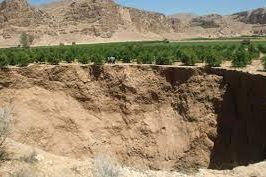
Nearly half of Iran's population currently resides on or near areas prone to land subsidence, according to reports from the Ministry of Roads and Urban Development.

Nearly half of Iran's population currently resides on or near areas prone to land subsidence, according to reports from the Ministry of Roads and Urban Development.
Ali Beitollahi, the head of the vulnerability research section at the Road and Urban Development Research Center, pointed out that subsidence areas are expanding, predicting that adjacent zones will soon be engulfed by the main subsidence plains.
He warned that “Tehran, Mashhad, Shiraz, Kerman, and most importantly Isfahan, are precisely in the subsidence area.”
In Isfahan, concerns are intensifying as the situation poses a direct threat to its historical edifices, including the iconic Naqsh-e Jahan Square and numerous ancient bridges.
The subsidence phenomenon could lead to irreversible environmental damage, including water resource depletion, reduction in agricultural outputs, transformation of fertile lands into deserts, and the formation of deep fissures in the earth.
Reports indicate that the subsidence issue has worsened considerably over the past five years, with Beitollahi emphasizing that the affected area in Iran has tripled in size during this period.
The threat is so significant that a minor earthquake could trigger a major catastrophe, particularly in Isfahan, endangering over 2.7 million lives. From 2020 to 2021, Isfahan experienced subsidence rates nearly 40 times higher than the global average.
The ongoing crisis threatens to jeopardize 380 cities and 9,200 villages across Iran in addition to its natural ecosystem.
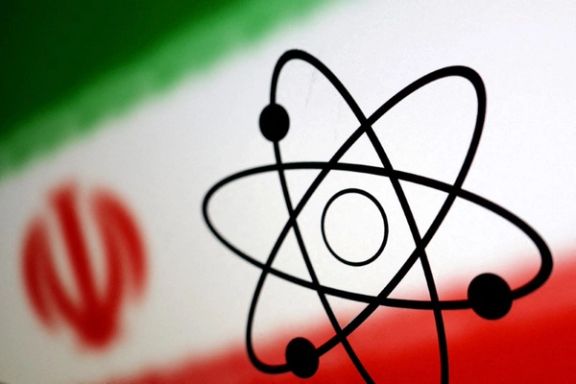
Javad Karimi Ghoddusi, an Iranian lawmaker, again stirred international concern by asserting that Iran could elevate its uranium enrichment from 60 to 90 percent in just half a day.
His remarks, delivered via a video released on Wednesday, imply that Iran could rapidly produce the main fuel for nuclear warheads.
Ghoddusi emphasized that despite the Supreme Leader's fatwa declaring the production and use of nuclear weapons unacceptable, Iran could escalate its response to match any nuclear threats it faces.
"If we are threatened with nuclear weapons, we will respond with a nuclear threat," Ghoddusi stated, indicating that conventional weapons like Katyusha rockets would be insufficient in such scenarios.
Foreign Ministry spokesperson Nasser Kanaani said on Monday that "Nuclear weapons have no place in our nuclear doctrine," referencing the so-called “nuclear fatwa” by Supreme Leader Khamenei, which bans the development of nuclear arms.
However, the authenticity and enforceability of this fatwa are widely debated among experts, with some suggesting it serves more as a diplomatic shield amid Iran’s enrichment more than a binding decree.

US President Joe Biden on Wednesday signed into law the national security legislation passed by Congress that includes several Iran-related sanctions bills, such as the MAHSA Act penalizing Tehran's human rights violations.
The legislation requires Biden to make a determination with respect to sanctioning Iran’s Supreme Leader Ali Khamenei’s office and that of the Iranian president. Biden should report to Congress every year whether those officials should remain under existing sanctions, making it much harder for the current and future administrations to unilaterally lift the sanctions.
The US Senate on Tuesday night unanimously passed the foreign aid package that incorporates the Iran sanctions. Another bill incorporated into the legislative package is Stop Harboring Iranian Petroleum Act or the SHIP Act, which targets Tehran’s illicit oil exports in defiance of US sanctions.
During the voting session on Tuesday night, 79 senators voted for the landmark $95-billion aid package for Israel and Ukraine, which also includes Iran-related sanctions bills.
Eighteen senators voted against the bill, but it was finally passed by the Senate and now awaits President Joe Biden's signature before it can be implemented.
Immediately after the Senate's adoption of the bill, Joe Biden said he will sign the bill passed by the Senate into law on Wednesday.
“Tonight, a bipartisan majority in the Senate joined the House to answer history’s call at this critical inflection point. Congress has passed my legislation to strengthen our national security and send a message to the world about the power of American leadership: we stand resolutely for democracy and freedom, and against tyranny and oppression,” he said.
During an unusual Saturday session, the US House of Representatives had passed the $95 billion aid package for Ukraine and Israel, which also incorporated three bills targeting the Iranian government.
The main bill targeting the regime, dubbed the MAHSA Act, was introduced after nationwide protests rocked Iran in 2022-2023. The unrest began after a 22-year-old woman, Mahsa Amini, died in hijab police custody in September 2022. During the protests, regime forces killed around 550 protesters, injured hundreds and arrested over 22,000 people.
The Mahsa Amini Human rights and Security Accountability Act, or simply the MAHSA Act, will see the imposition of sanctions on Iran’s supreme leader’s office, its appointees and anyone affiliated with the office and its work. It is a huge nod to the impact that the 22-year-old’s death has had globally since September 2022.
Iranian-American activists campaigned persistently for the past year, as the Senate Democrats delayed putting the measure to a vote, while it had overwhelmingly passed the House. Earlier this month. A watered-down versions of the bill finally passed the Senate Foreign Relations Committee, before the original version of the Act has been incorporated into the larger aid package and is expected to pass the Senate.
The Mahsa Act requires the US government to impose applicable sanctions on Iran’s Supreme Leader Ali Khamenei, his Office and his appointees, Iran’s president and a number of entities affiliated with Khamenei.
The bill also requires the US President to report to Congress every year whether those officials should remain under existing sanctions, making it much harder for the current and future administrations to unilaterally lift the sanctions.
The other bill which includes the SHIP Act requires the President to impose visa- and property-blocking sanctions against foreign persons that knowingly transport, process, refine, or otherwise deal in petroleum and petroleum products (including petrochemicals) originating in Iran.
(The report was updated at 20:20 GMT)
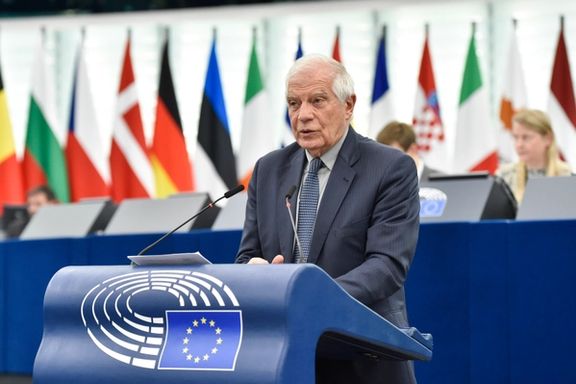
The EU’s foreign policy chief has reiterated the bloc's refusal to label Iran's Islamic Revolutionary Guards (IRGC) as a terrorist entity, sparking further criticism by MEPs during Wednesday's plenary debate.
In response to Iran’s attack on Israel this month, Josep Borrell said new measures are being leveled against Tehran, which include expanding existing sanctions regimes related to drones and missiles, as well as extending these measures to Iran-affiliated groups in the Middle East.
The EU has not designated the IRGC as a terrorist organization, despite calls to do so and a resolution by the European Parliament last year voting to that effect.
Arguing that the bloc has already listed Tehran’s paramilitary force under the “Iran Weapons of Mass Destruction” sanctions’ regime, Borrell said that “listing this organization as a ‘terrorist organization’ would have no practical effect.”
In response to Borrell’s argument that the legal grounds for the listing have not been met, Charlie Weimers, a Swedish representative, called the EU chief “a liar.”
“That is nonsense. Here, I have the council's secret legal opinion. Nowhere in this document does it say that it has to be an authority in the EU…“You know that. You knew the truth. You shamelessly lied to protect the IRGC. We won't miss you, Mr. Borrell, but I'm sure the mullahs will,” Weimers stated.
German MEP Hannah Neumann, who has long argued for the designation of the IRGC, said: “What more does this regime have to do until you finally wake up to the harsh realities? The IRGC is a terror organization…The drones and missiles attacking Israel and attacking our ships in the Red Sea are manufactured in Iran, and we should have sanctioned all those involved months ago.”
“And last but not least, the regime is not legitimately representing the people of Iran, and you should stop pretending it would,” Neumann added, directly addressing Borell.

Several MEPs and activists have taken steps to prepare the groundwork for the EU to act on calls to list the IRGC as a terror organization.
Last July, two MEPs stated that the IRGC could be listed without any legal obstacles under Article 1(4) of the "Common Position 2001/931/CFSP."
This point of view was also espoused by Iran's exiled prince Reza Pahlavi, citing a group of French-Iranian lawyers who held the view that the European Union does not have any legal obstacles to blacklisting the Revolutionary Guards.
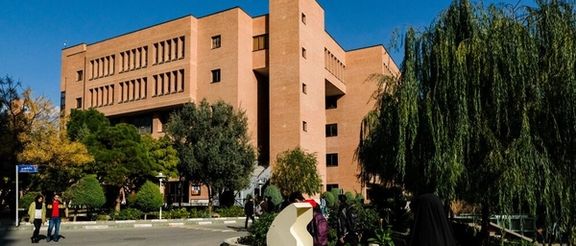
The Biden administration funded a research project involving an Iranian scientist from a university associated with Iran's illicit nuclear program, according to findings by United Against Nuclear Iran (UANI).
Mohammed Hasan Ravanji, a professor at Tehran-based Sharif University of Technology (SUT), collaborated on this research project, which received funding from the US Department of Energy's Solar Energy Technologies Office.
Late March, UANI, a US non-profit opposing Iran's nuclear program, raised concerns over this collaboration with the Iranian university, which faces sanctions over its links to Iran's nuclear and military activities.
In a letter addressed to several US government officials, including Jennifer Granholm, Secretary of Energy, UANI highlighted a co-authored paper resulting from the collaboration between a researcher from the National Renewable Energy Laboratory and Sharif University's Ravanji.
The Iranian university, close to the regime, faces multiple sanctions by the US and other Western nations – including financial sanctions imposed by the EU and UK for helping Tehran develop ballistic missile technology.
The letter by UANI also says that SUT and its affiliates are subject to what’s known as "secondary sanctions" – which target third-party entities that engage with them, including international partners.
Iran International has not independently seen evidence that the research project contravenes any US sanctions or breaks any laws.
“We are sure that you agree that a national laboratory of the US Department of Energy should not be cooperating with such entities or their researchers/employees—under any circumstances,” UANI CEO and former US Ambassador Mark Wallace wrote in the letter.
Andrea Stricker, Deputy Director of the FDD’s Nonproliferation and Biodefense Program, who researched Sharif University's role in illicit procurement for nuclear programs, expressed her concern about the US government funding institutions of a key adversary.
“While recognizing the benefits of scientific collaboration, it is crucial for DOE and Congress to evaluate whether these efforts could potentially compromise bilateral security realities,” Stricker told Iran International.
Adding to concerns over the collaboration, was Republican Senator Joni Ernst, who questioned Energy Secretary Jennifer Granholm at a Senate Armed Services Committee Hearing last week.
Ernst highlighted her concern and questioned whether US taxpayer dollars were used for the research project.
Under questioning, Granholm stated, "I'm not familiar with this grant," and separately stated that US taxpayer funds generally should not be directed towards sanctioned countries or entities.
Earlier this year, the Guardian reported on academics in the UK, Australia and the US collaborating on research related to drone technology with the same Iranian university.
“The collaborative research was described by one security expert as having direct military applications, while another called it potentially ‘very dangerous’,” the report read.
Separately, the Iranian diaspora has long called for Western universities to stop accommodating academics and scientists who they say have served and continue to normalize Iran’s dictatorship.
One such case is that of Iranian academic Hossein Mousavian, who is currently a Middle East Security and Nuclear Policy Specialist at Princeton's Program on Science and Global Security at Princeton University.
Mousavian, a former spokesman for the Iranian nuclear negotiating team and a former senior staffer for the regime’s Supreme National Security Council, is subject of an inquiry by the US House of Representatives Committee on Education and the Workforce who suspect him of advancing Iranian interests.
Led by Rep. Lisa McClain (R-Mich.) and Rep. Jim Banks (R-Ind.), a group of 12 Republican committee members authored a letter to Princeton University, expressing concerns about Mousavian's influence on campus. They highlighted his attendance at Qassem Soleimani's funeral and his appearance on Iranian state TV as reasons for their apprehension.
Last month, the National Association of Scholars (NAS) in the US also echoed the calls for Princeton University to discharge the services of the former Iranian government official.
Mousavian has repeatedly denied the allegations made against him.
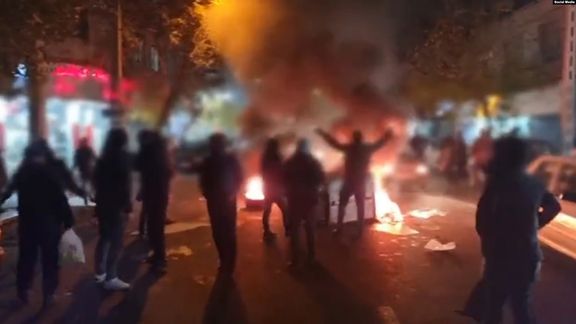
Amnesty International’s 2023 report on Iran details extensive human rights violations following the 2022 “Woman, Life, Freedom” uprising including unlawful arrests and physical abuse.
The report, published Wednesday, highlights the Iranian authorities’ intensified suppression of freedom of expression, association, and peaceful assembly, particularly targeting women and girls defying compulsory hijab laws.
According to the report, security forces employed unlawful force and mass arrests to quell protests.
“Thousands were subjected to interrogation, arbitrary detention, unjust prosecution, and imprisonment for peacefully exercising their human rights.
“Enforced disappearances, and torture and other ill-treatment were widespread and systematic. Women and girls, LGBTI people, and ethnic and religious minorities were subjected to systemic discrimination and violence,” read the report.
It also criticized the continued use of cruel and inhuman punishments including flogging and an increase in executions, which were described as a tool of political repression.
The Iranian government also censored media, jammed satellite channels, and blocked or filtered numerous mobile apps and social media platforms, significantly restricting freedom of information.
Moreover, the authorities continue to ban independent political parties, civil society organizations, and trade unions, and have retaliated against workers and labor rights activists for participating in peaceful gatherings.
The judiciary played a pivotal role in entrenching impunity for torture, enforced disappearances, and other human rights violations.
Amnesty's report sheds light on the severe conditions and abuses faced by detainees, including denial of adequate healthcare, suspicious deaths in custody, and the implementation of torturous legal punishments such as flogging, amputation, and blinding.
The systemic discrimination and violence extended to women and girls, with the authorities intensifying the crackdown on those who defy the compulsory hijab laws. Punitive policies severely violated their social, economic, cultural, civil, and political rights, restricting their freedom of movement.
The US State Department on Monday also released its annual report on Iran's human rights situation, stressing that the country's "already severe restrictions on human rights worsened in a number of areas" during 2023.